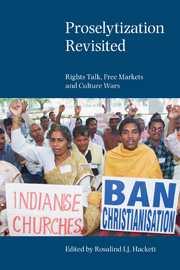Book contents
- Frontmatter
- Contents
- Preface and acknowledgements
- Contributors
- Revisiting Proselytization in the Context of Rights Talk, Free Markets and Culture Wars
- Section I
- Section II
- Section III
- Section IV
- Negotiating Proselytism in 21st Century Russia
- Between Da'wa and Mission: Turkish Islamic Movements in the Turkic World (Central Asia and the Caucasus)
- Siritual Wars in the 10-40 Window: Korean Proselytism among Russia's Asian Minorities
- Section V
- Index
Siritual Wars in the 10-40 Window: Korean Proselytism among Russia's Asian Minorities
from Section IV
- Frontmatter
- Contents
- Preface and acknowledgements
- Contributors
- Revisiting Proselytization in the Context of Rights Talk, Free Markets and Culture Wars
- Section I
- Section II
- Section III
- Section IV
- Negotiating Proselytism in 21st Century Russia
- Between Da'wa and Mission: Turkish Islamic Movements in the Turkic World (Central Asia and the Caucasus)
- Siritual Wars in the 10-40 Window: Korean Proselytism among Russia's Asian Minorities
- Section V
- Index
Summary
This chapter seeks to illuminate the activities of Korean Protestant missionaries in the Asian part of the Russian Federation, or, to be more specific —the autonomous republics of South-western Siberia, which are inhabited by a number of ethnic groups. I begin by exploring the contemporary religious situation in that region, and give a brief description of the indigenous groups in the late 1990s. Then I introduce my fieldwork materials, collected in 2004–2005 in the Altai, Tuva, and Hakhasia regions, which focus on the interaction between Korean missionaries and representatives of the local cultures in Siberia. In conclusion, I discuss the main reasons why the Koreans succeeded in church-planting in some regions of Siberia, and not in others, in light of the general characteristics of Korean proselytizing strategies.
Overall, the phenomenon of Korean missionaries has generally been overlooked by religion scholars in Russia. From 2000 onwards, articles have begun to appear on Protestant expansion, but they tend to be localized studies, offering no comparative perspective or analysis of broader trends. There is some literature produced by anti-cult centers which decries the embracing of new Protestant sects over Orthodox tradition, and one region in the Far East of Russia (Primorski) is now making available online interviews with local officials regarding Protestant missionary activity. But, for the most part, my findings are taken from interviews with regional government officials, religious leaders, and pastors.
Following the liberalization of post-Soviet territories, Russia, as well as other states, became the object of local and foreign missionary activities.
- Type
- Chapter
- Information
- Proselytization RevisitedRights Talk, Free Markets and Culture Wars, pp. 389 - 408Publisher: Acumen PublishingPrint publication year: 2008



